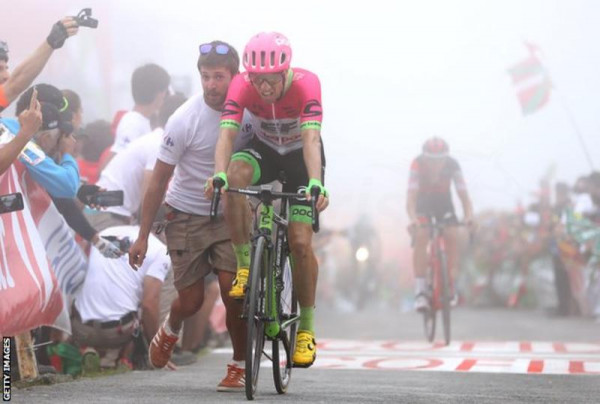You may not have noticed Michael Woods before. He is undemonstrative, despite his team's bright pink kit. He is slight, even by the standards of professional cycling.
Much of the rest is extraordinary - what happened to him on his way to the top; what he went through at the moment he reached it.
A man who continues to feel like an imposter in someone else's world is still meeting triumph and disaster all the way.
Stage 17 at the 2018 Vuelta a Espana was a brute: 157km through mountainous Basque country, the finish up a rough concrete track with an average gradient of 11% across its final four kilometres, with ramps towards the end of 24%.
That sort of road would be difficult to walk up. Racing up it - a thick fog on the mountain, thousands of spectators on the verges peering through the murk - produced a sort of slow-motion torture.
With a kilometre remaining, Woods was one of four alone at the front. With 600 metres to go, the Belgian Dylan Teuns attacked. Woods went with him.
"I was in a world of hurt," Woods says. "And when I then attacked, I assumed there were only about 150 metres left, because there was so much fog and so many fans, I just couldn't see up the road.
"When I looked up and saw 500 metres to go, I thought, oh man, I don't know how I can sustain this. And I started to die."
You watch back the final moments of that climb now and it still has an air of unreality: a man at his limits, mouth hanging open, barely managing to keep turning the pedals; the shouts of the fans, the flags and arms and clenched fists being waved in his face, his pink helmet and yellow jersey the only brightness in the oppressive gloom.
"I heard my sport director Juan Manuel Garate on the radio," says Woods. "Juanma is an incredible human, an incredible director, and he knew how much I wanted to do something for my family.
"He didn't use it all race. He waited for this very moment. He came on the radio said to me: 'Do it for your family, Mike. Do it for your family.'"
At that time, September 2018, Woods was in the best physical shape of his life. He had ridden well the whole year and arrived at La Vuelta in peak condition. Only his family and team knew that everything else was falling apart. A few months before, his unborn son Hunter had died suddenly at 37 weeks old.
"Both my wife and I were super-excited that this was going to be our first child, that we were having a baby boy," says Woods. "And we found in our final check-up that he had passed away.
"It was devastating. We had so much excitement and such high expectations. It was the hardest moment I've ever had to go through. I've never lost anyone that close to me before.
"It was especially hard watching my wife have to deal with it - deal with the trauma of post-pregnancy, when all these hormones and all these things are telling you that you should have this baby in front of you, and she didn't.
"I knew I wanted to do something special for Hunter. I wanted to honour him. I wanted to get a big result for him, because I just didn't know how to handle the grief. I immersed myself completely in cycling and training and preparing.
"I've never gone so deep in a race in my life. I couldn't even think, I was hurting that much."
Woods rode like a man trying to escape. Looking back repeatedly over his shoulder, desperately searching for his pursuers, he seemed to be staring back too at everything else in his wake.
Several times, he almost came to a halt. The last 200 metres took him almost a minute to cover, the road so steep, his body so spent. When he crossed the line, he seemed not to understand where he was.
He says: "It took me about 45 seconds just to collect my thoughts and get over the discomfort I was in and finally realise I had won the race. It was Hunter who got me across the line.
"It opened the floodgates. I cried for a while. I cried every day for a while after that. Just thinking about Hunter and thinking about what we'd gone through. Thinking how I finally won a World Tour race.
"I called my wife, and she picked up, and she said that she loved me, and I told her I loved her, and we just cried."
Short presentational grey lineWoods was never meant to be an elite pro cyclist. As a kid growing up in Canada, he loved ice hockey. No-one he knew raced bikes.
When he was told in his teens that he was too small for the crash and bang of hockey, he threw himself into running, and by the end of high school had broken national records at 1500 metres, finished seventh at the World Junior Championships and won the Pan-American Championships.
Those were the good times. The bad were the constant injuries. At 21, he was close to the Olympics. At 24, he was gone from the sport, back living with his parents in Ottawa, with no goals and no idea of what came next.
"I became this sad figure who worked in a running store and was kind of living in the past," he says. "Wishing I was running and racing but unable to do so."
Getting out of shape, getting big, he borrowed his dad's bike and began doing a few rides, first on his own, and then with a small group based around the local bike shop.
"Initially, I was just doing it for fitness," he says. "The plan was still to get back running and have success with that. But that autumn, in a local road race, I broke my foot for the final time, and afterwards I sat down with my girlfriend, and she told me I should maybe have a real stab at cycling.
"We were both completely naive and ignorant about how hard it would be to become a world-class cyclist. I just assumed that because I had been a world-class runner at one point that I should be super-fast at becoming a world-class cyclist.
"But because of that ignorance, I was able to do it. If I'd known what I know now, I probably wouldn't have got into it in the first place. It was too tough a transition."
A few other cyclists have transitioned from other sports before. Those who make it tend to stick to the track, riding solo against the clock, or specialising in time-trialling - all of the cardiovascular advantages of their old lives, very little of the bike handling and wheel-to-wheel carnage of a brutally competitive peloton.
Woods has been named in the EF Education First provisional team for this year's Tour de France
Woods wanted more. With no money and no other avenue to chase, he also had nothing to lose.
"Because I had such a big engine, I was able to find myself at the front of bike races in Canada quite easily, just because the fields were so small," he says.
"You learn most in racing by being at the front, and although I was doing nothing, I was seeing how races unfolded, and I was able to learn fast. And because I had trained so hard as a runner, because I was able to push myself to my limits, I had some mental tricks up my sleeves.
"I committed every faux pas when I came in. I got teased mercilessly because I showed up to group rides looking like a triathlete.
"Running is such a pure sport. Especially where I came from, there was such an emphasis on having as few things as possible, being the most hardened bad-ass guy out there, just wearing a pair of sweat-pants on a run.
"When I came into cycling, there was such a huge transition in learning and navigating that sort of politics and snobbery. Ultimately I didn't really care too much what people thought about me. What I did care about was my bike-handling skills.
"I was fortunate to have that huge sports background playing hockey, doing downhill skiing. My parents put me in tons of different sports, so I was able to transition fast. But my bike-handling took a long time to develop, and I got some pretty impressive scars as a result."
Woods was a fast learner but the road was steep. Taken on for six months by a struggling Italian team, he crashed badly in a key race, sustaining facial injuries and a broken orbital bone. He joined the small US team 5-Hour Energy only for that to go out of business.
Only when the Cannondale-Drapac team took a late punt on him three years ago, when he was 28 years old and fast running out of time, did he begin to think he may have made the right choice.
In his first Grand tour, he finished 38th overall at the 2017 Giro d'Italia, and then seventh at the Vuelta a Espana four months later, his ability as a climber beginning to show through.
Nine months on, Woods - now 32 - is looking to the future again. He finished third at last September's World Championships and is eyeing up his first ever Tour de France in July.
Beyond that he is less sure. He is at an age when most riders are at their peak. Coming in so late, he may still have further summits ahead.
He says: "I'm a huge believer in personal improvement, and that one of the keys to having a fulfilling life is seeking to improve yourself. To challenge yourself.
"In Canada, when they find out you're a professional cyclist, they always ask if you've done the Tour, and until now I've had to say no, knowing that in their eyes that means I'm not a professional cyclist. So I want to do it just be validated.
"I feel too that in cycling I'm still improving, I'm still learning. And I'm still challenging myself, on a daily basis."


